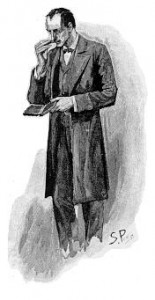How can we keep our focus when our informational world has paced almost everything at hyper speeds?
By definition, a distraction is a detour. It happens when the continuity of some effort is broken by the need to shift attention elsewhere. Since this website is dedicated to communicating in “the age of distraction”—be it advertising clutter, too many texts and e-mails, or the frenetic pace of overscheduled lives—we should have an interest in persons who resist all the cultural noise. For the record, the problem isn’t entirely new. The ballad “Over The Rainbow” (1939) was initially cut from the Wizard of Oz because some bright light in the studio’s front office thought that it slowed things down.
The Advantages of Linear Thinking
One answer to this problem is to discipline ourselves to follow a more linear pathway, even though cultivating this kind of thinking cuts against the grain of the culture. And it’s not easy to tell the world to take a hike while we muse alone in our own self-made bubble.
Linear thinkers take many forms: avid readers content to devote large chunks of time to a single work of fiction or non-fiction, artists happily left alone to work through decisions that will end up on canvass or as musical notation. We’ve enshrined the image of the “mad scientist” as a loner following the threads of their research with long hours in the lab, leaving family and friends to fend on their own.
 If previous generations were more focused, our Twitter world is more scattered. The folks that track these things indicate that the average American checks his or her phone nearly 100 times a day. Much of American television is predicated on breaking for a range of short commercials: so many, in fact, that a viewer can momentarily forget what they were watching. And the programs themselves are edited to the beat of a fast song, with shooting angles and cutaways coming every few seconds. Fast cutting, where camera changes may happen every two seconds, is in style. The long single ‘take’ is relegated to a few auteur film directors who are willing to gamble that an unbroken shot can be interesting.
If previous generations were more focused, our Twitter world is more scattered. The folks that track these things indicate that the average American checks his or her phone nearly 100 times a day. Much of American television is predicated on breaking for a range of short commercials: so many, in fact, that a viewer can momentarily forget what they were watching. And the programs themselves are edited to the beat of a fast song, with shooting angles and cutaways coming every few seconds. Fast cutting, where camera changes may happen every two seconds, is in style. The long single ‘take’ is relegated to a few auteur film directors who are willing to gamble that an unbroken shot can be interesting.
Linear thinking is the realm of the problem-solver, the creator, the owner of a consciousness that will discover and understand what a fragmented thinker may never find.
George Frederick Handel wrote the great oratorio Messiah in spurt of nearly unbroken concentration, finishing in just over three weeks. And imagine the sustained effort required by William Lamb’s architectural firm, who designed and prepared drawings for New York City’s Empire State Building in an incredibly short two weeks. The iconic skyscraper was completed in just over a year. Such dedication to a single task can be scaled down to what many writers sense when they notice the time that vanishes when they are absorbed in their work.
The linear thinker routinely does what many vacationers hope for: a chance to clear the decks of everyday clutter sufficiently to see an unobstructed view of the horizon. Undisturbed concentration gives them power. It may happen when we are walking, watching a sunset, or perhaps sitting alone on a boat dock with nothing else to distract. These are the realms of the problem-solver, the creator, the owner of a consciousness that will discover and understand what a fragmented thinker may never find. Unbroken attention allows a first effort to build on the synergies that begin when scattered thinking begins to see connections and consequences that others may miss.
The Mistake of Pushing Complexity Out of Bounds
This is the reverse of the kind of segmentation of effort that is now embedded in our work and so much of our media. A reader’s time on a single web page is usually under a minute. And we are getting cues from all over that we’re not noticing our preference for hyper-compression. Consider, for example, the New York Times reporter who recently noted in passing that an individual “argued” a point “on Twitter.” Really? Can a person “argue” in the traditional sense of the term—which includes asserting a claim and its good reasons—in a verbal closet of fewer than 500 words? Twitter imposes absurd limitations on the expression of a complete idea, and is easily matched by political ads that “argue” public policy in 30-seconds, television news “sound bites” from policy-makers that average around eight seconds, and the de-facto editing style of commercial television that cuts individual shots down to lengths of two or three seconds. All of this means that there is no time for enlarge on the complexities of issues or attitudes.
We now think of a Ted Talk with a maximum running length of 18 minutes as an “in depth” discursive form. No wonder some of my students thought of a 70-minute lecture or a 40- page chapter as the functional equivalent of a long slog across a vast and empty space. All of this makes our dawning recognition that reading levels are falling even more worrisome. One of the great virtues of juvenile and adult literature is that the process is still mostly linear. Like the rest of us, kids are easily hooked on continuous and sequential narratives.

Interestingly, one of the features sometimes seen in a person at the higher end of the autism spectrum scale is a consuming and total passion for one thing. Subjects on the spectrum are especially known for their laser-focused interests, making them a challenging fit in a culture that rewards frequent pivots to completely different activities. But the habit of extended attention can be a blessing. Psychological historians believe we can thank mild forms of autism for the achievements of Mozart, Beethoven, Charles Darwin, and Lewis Carroll. And it is surely the dominant psychological trait of the world’s favorite sleuth, Sherlock Holmes.
Given the misplaced importance of multi-tasking across the culture, it makes sense that there is building interest in novel ideas like the self-driving car. Negotiating a ribbon of open road is a literally a linear process that seems increasingly beyond the capacities of many drivers. It’s probably better to let a computer take care of a task that many aren’t mentally equipped to manage themselves.
One small suggestion for moving back to a state of extended consciousness on one thing is to pick a major orchestral work or favorite writer, making it a point to ‘swim’ in their waters for more than a few minutes. The trick is to not take on another task for an alternate source of attention. You will hear or see more. The hard truth is that thinking well about a subject needs effort and concentration.
![]()


